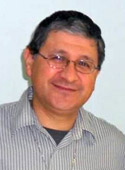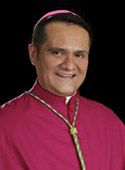
FIP President’s Note:
By Reynaldo Montemayor Jr., PhL.
President of the FIP
Director of Pastoral Institute - Diocese of Laredo (TX)
June 21, 2012
By What Authority?
 · TO SEE
· TO SEE
What we have seen these days is a war against organized religion and the right use of conscience by some in government, the US Catholic bishops fighting for these fundamental freedoms, the treacherous reactions by some institutions within our Catholic Church, the Pope’s visit to Mexico in the land of the Cristero persecution, the debut of a movie on the Mexican Cristero war in the mid twentieth century against a socialist persecution of the Church (Cristiada or For Greater Glory), etc. The positive events make me feel proud to be a Hispanic Catholic of Mexican descent. May the blood of the martyrs run through our veins in the communion of saints! ¡Viva Cristo Rey! But the negative events of dissent and rebellion within the Church have shocked and saddened me. These divisions in our nation and within our Church make me ponder “By what authority do they do these things?” (cf., Mt 21, 23).
· TO JUDGE
What can we JUDGE if we ask “by what authority” does the state do these things? We know that “all authority comes from God” (Rm 13, 1). But this does not justify- nor deify- all human authority, particularly the authority of the state, as something sanctioned by God unconditionally, as if tyrants and persecutors of Christians would be justified in their abuse of authority. We know that human authority is not absolute but limited within right reason, by good ethical-moral boundaries, by natural and divine law, etc. These moral limits implied and applied to human authority express respect, harmony and collaboration with God’s Will. Human authority or the authority of the state “comes from God” only as much as it is in accord with natural/divine law: God’s Will. So, human authority would be legitimate if it is subordinate to the Will of God; and illegitimate, if it is contrary- or blasphemously daring to be superior- to the Will of God, especially recognizable in the natural law whose “principal precepts are expressed in the Decalogue” (CCC 1955). This is why Peter responded to his persecutors, “We must obey God, rather than men!” (Acts 5, 29) Fundamental rights and freedoms come from God and not from the state! The confusion and debate on this issue reveals two distinct philosophical-theological views of human authority, as either subordinate to the Good, or above the Good; as submissive to what is right and true, or defiant (and re-defining?) of what is right and true. As Catholics we must affirm that the state has no authority to neither grant nor take away, but only to protect, our God-given rights and freedoms to primarily and fundamentally fulfill our duty to know and obey God’s Will!
“By what authority” do the US bishops do these things? If “all authority comes from God”, then bishops as true successors of the apostles receive their authority directly from Jesus Christ himself. The God-made-man said to his apostles: “All power in heaven and on earth has been given to me. Go, therefore, and make disciples of all nations, [… ], teaching them to observe all that I have commanded you.” (Mt. 28, 18-20). As Catholics we must affirm and assent with the obedience of faith that bishops have legitimate authority to guide and govern the Church as true shepherds. Jesus said to his apostles, “Whoever listens to you listens to me” (Lk 10, 16)! But this human/divine authority that bishops enjoy is not understood by the Church as absolute. A bishop’s teaching authority, for example, is not absolute but limited by not only the moral limits mentioned before, but also conditioned by communion with all other bishops and the Pope, and within matters of faith and morals. A bishop’s teaching authority would be legitimate-and even infallible-, in as much as he teaches in communion with all other bishops and the Pope on faith and morals. We know that they have authority not only to teach, but also to sanctify and to govern. So also, the governing authority of a bishop is legitimate when “exercised in communion with the whole Church under the guidance of the Pope” (CCC 895) for the pastoral care of those entrusted to him to make them faithful disciples of Jesus. The USCCB, bishops in communion with each other and the Pope, is calling all Catholics to defend ourselves against the attacks to our religious and conscience freedoms detonated by the HHS Contraception Mandate. And we know that in God-given rights and duties, as in matters of faith and morals, “We must obey God, rather than men!” So, we must obey our bishops, who legitimately represent Christ (God) among us, rather than illegitimate secular authority! In fact, those with secular authority, if they are Catholic, should also obey the bishops concerning God-given (natural) rights, and in matters of well-defined faith and morals. All Catholics “should be closely attached to the bishop as the Church is to Jesus Christ, and as Jesus Christ is to the Father” (CCC 896). Catholics in secular authority are not exempt from this unity and communion! They, as all Catholic laity called to transform the secular order under Christ’s kingship of justice and charity, must trust that good politics should never be opposed to, or at war with, Catholic Christian faith and morals, as pointed out in the living Magisterium of the Church.
Therefore, we can also JUDGE that it is a great scandal for individual Catholics and Catholic institutions to betray the Church and provoke division and confusion within it by choosing to obey men rather than God, a political party rather than the Church, in these fundamental matters of well-defined faith and morals! All of us Catholics must be in close communion with our bishops in these grave times of growing persecution in our country!
“By what authority” do we as pastoral agents or institutions do these things? If “all authority comes from God”, for us in the Church this God-given authority is more of an “ecclesial permission” to do what we do, since it depends on the support, recognition and/or approval of a bishop, or bishops, of the Catholic Church. We find moral authority and teaching credibility from Christ’s mandate- as if directed to all the Church- for “making disciples of all the nations” (cf., Mt 28:19). But we cannot deny the fact that the apostles were originally and directly given this mandate (and the authority implied in it) to “make disciples”. So, what we do as pastoral agents or Church institutions, we do under the authority of the Church hierarchy who allows us to participate and collaborate directly or indirectly in the fulfillment of, or in response to, its mandate to make disciples. A Catholic institute of formation, for example, bases its teaching mission and existence on a bishop’s- or group of bishops’- authority that “institutes” it as a formal participation in his (their) munus docendi primarily, and indirectly in their muneri to sanctify and to govern also, to help make disciples in and for the Church. To be in communion with episcopal authority and the Magisterium grants an intra-ecclesial moral authority to serve “in the name of the Church”. But this moral intra-ecclesial authority is also not absolute, and must always be checked and balanced by communion with the bishops and the Pope, the Magisterium of the Church, etc. Without this communion a Catholic institution or ministry would ipso facto lose its legitimate moral ecclesial authority to do what they do “in the name of the Church”, for it is not in communion with the whole Church. In a way, for such institution to choose to obey men rather God, to obey cultural, academic, socio-political interests rather than what the Church teaches, is to betray their legitimate moral authority to serve “in the name of the Church” to instead act in its own name and authority. Even if their self-authority be highly prestigious for the world’s secular standards, it would certainly be worthless for the Church’s evangelical standards! A Church institution that makes such a choice causes division and confusion if it deceives others or itself to be acting as if “in the name of the Church” when it is really not.
· TO ACT
So, how should we ACT? As president of our humble national Federation of Pastoral Institutes, I invite and exhort all our institute members, as responsible agents of faith and ministry formation within the Church, to express their obedience, communion and concrete support to their own bishop, and to all our bishops. All the FIP members must give a united and clear sign and witness of how we truly and legitimately serve “in the name of the Church”. We must all do what we can to support and promote the Fortnight for Freedom initiatives in our areas and around the country.
All pastoral institutes must assure and cultivate not just the quality but the fidelity to the Magisterium of the Church of their instructors, the faith formation content in their courses and the curriculum of their programs, etc. A pastoral institute’s teaching authority, or moral authority to teach, is legitimate only if in communion with the Church, its hierarchy and its Magisterium, etc. A pastoral institute of formation gives an authentic ecclesial service and grows in true ecclesial prestige in as much as it exercises its legitimate authority to teach and to form “in the name of the Church” precisely because it is truly in communion with the Church.
As president of this Federation of Pastoral Institutes, I exhort all our institute members and friends to commit in giving this type of prestigious service to the Church. I pray that our unanimous, clear and dedicated example of fidelity may encourage others in the faith formation ministry, as well as other servant Church institutions, to be faithful to their call and mission within the Church to courageously do what they do “in the name of the Church” and not just in their own name. May God bless us and our service to the Church. And may God bless America!
Reynaldo Montemayor Jr., PhL.
go back
 “The New Evangelization impels us to continue joyfully responding to the Spirit that never ceases to stimulate our communities to a deep conversion. Our call to celebrate the Gospel and to proclaim it to all our communities is at the very core of the creative ministry of the FIP. With years of Hispanic experience the Federation will continue to respond to the challenges of today’s world and will continue to serve by offering excellent faith, academic, and ministerial formation to our communities and beyond.”
“The New Evangelization impels us to continue joyfully responding to the Spirit that never ceases to stimulate our communities to a deep conversion. Our call to celebrate the Gospel and to proclaim it to all our communities is at the very core of the creative ministry of the FIP. With years of Hispanic experience the Federation will continue to respond to the challenges of today’s world and will continue to serve by offering excellent faith, academic, and ministerial formation to our communities and beyond.”